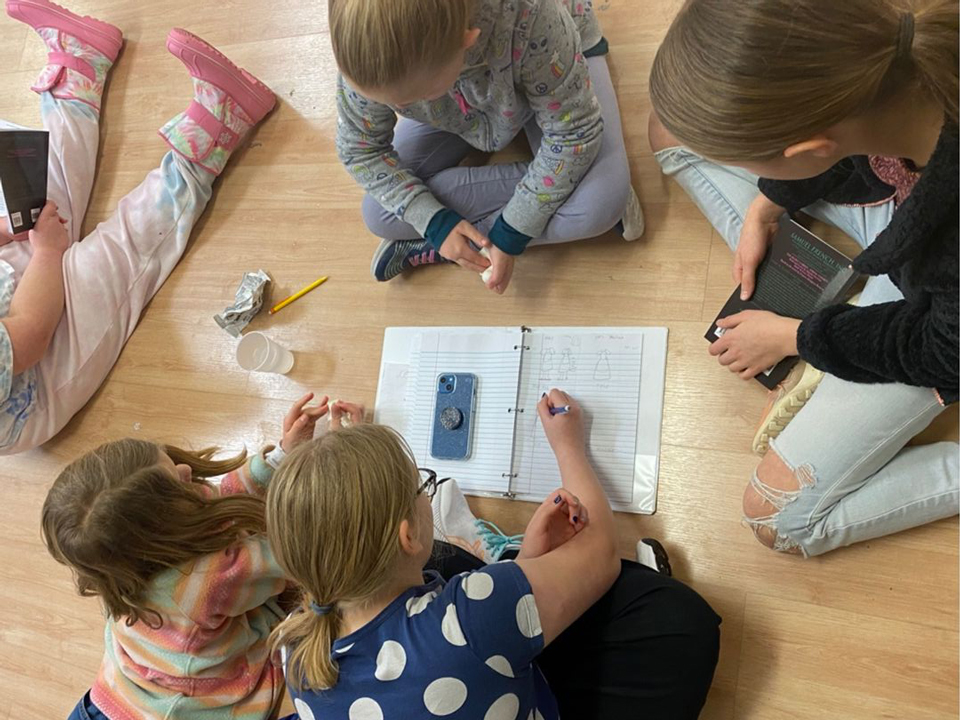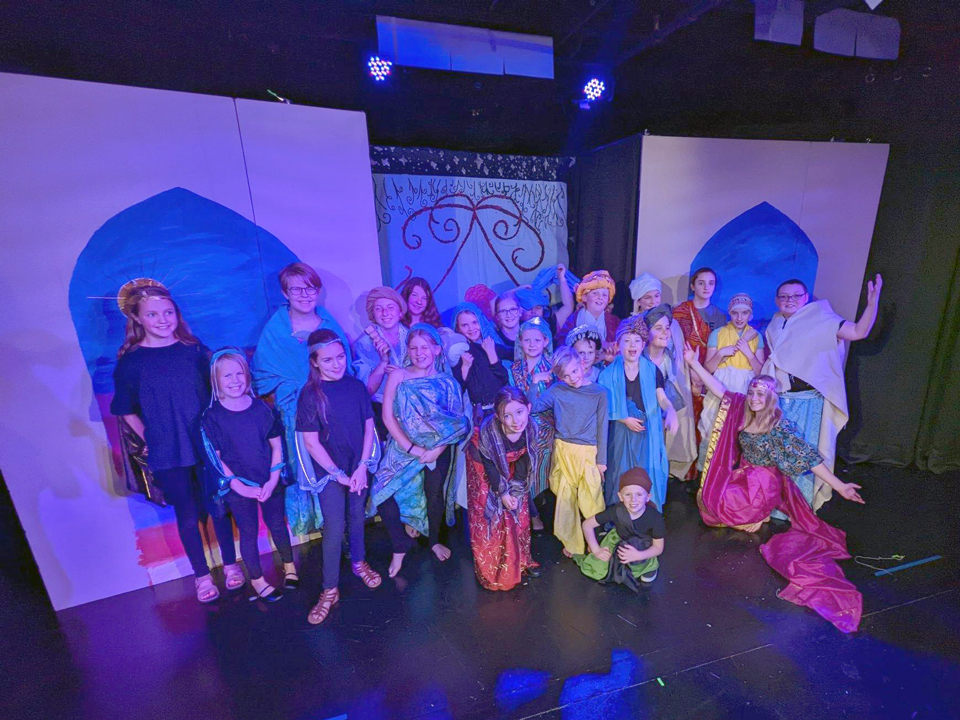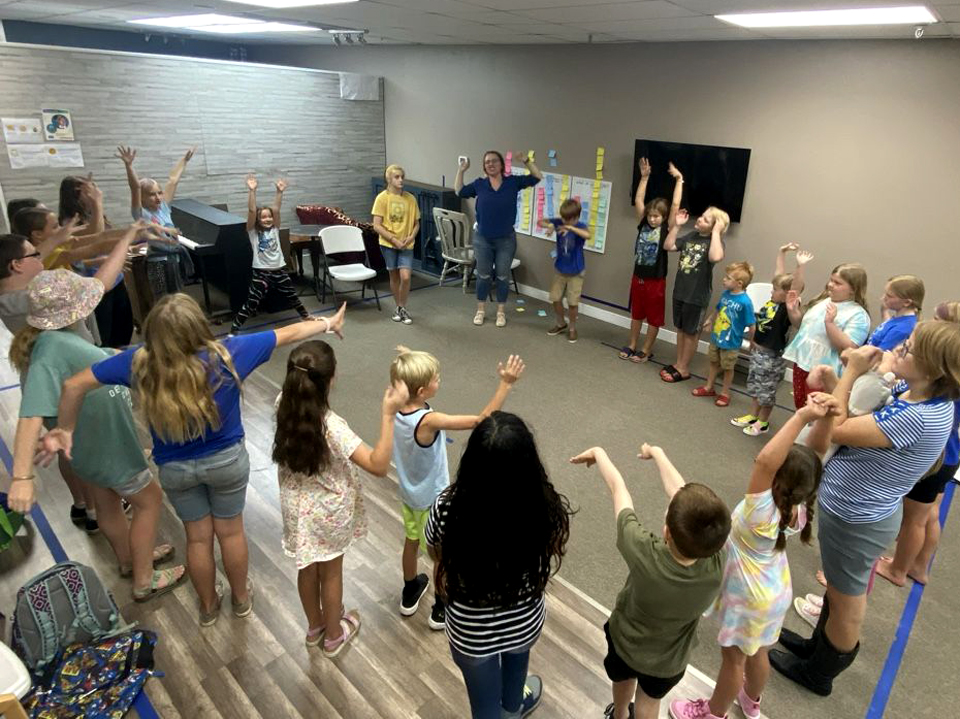
Helping students find their muse through creativity, responsibility, problem-solving, and collaboration.
Junior Class
(ages 7-11)
Senior Class
(ages 12-15)
Wednesdays from 10:30 am – 3:00 pm
Year-Long Class
Fee for Full Year: $825
Layton location only
Our theatre program has a strong base in all aspects of theatre— acting and technical. But it is also so much more! The play becomes the starting point, frame, and context for learning in this interdisciplinary class.
Students spend the semester learning about the world of the play, its history, culture, geography, science, engineering, and technology through hands-on projects and activities, many of which contribute to the final production as props, set pieces, or costumes. Students also experience a deeper level of empathy and understanding by participating as actors. Synergistically, their acting skills also increase because they have been immersing themselves in the world of the play.
This theatre program is intentionally different from others. Students have more opportunities for leadership roles such as designing sets, lights, props, costumes, directing, stage managing, even playwriting. Students also do the bulk of building for the show as well as performing.
Students will also be split into age, ability, and interest groups as appropriate during class and for different projects and performances.



2024-25 Performance Dates
Annie Jr.
April 10-12 and April 17-19, 2025
The 2024-25 MUSE program is full. Click above to be added to the waitlist.
What does the MUSE Performers theatre program look like?
MUSE Performers theatre program isn’t like your typical theatre program rehearsal. Instead, it is a project-based workshop for collaborative learning, creating, and performing.
Classes are multi-age so students have opportunities for mentoring peers and taking leadership roles, such as designing sets, lights, props, costumes, directing, stage managing, choreographing, even playwriting. Learning takes place in a hands-on fashion, with kids making and creating things, learning by doing, communicating and collaborating as a team, using their imaginations as they build their show.
Student learning is contained within the context of a play that takes between 12-16 weeks to produce. Each class period spends part of the time with context-related learning activities and part of the time in theatre skills and rehearsal. When not on stage, students have additional learning activities and creative projects they can work on so a lot is packed into a class day. We also take an hour recess and lunch break.
What do integrated academic subjects look like? The details vary from production to production, but here are some examples of how we start with a play and then incorporate different subjects along the way:
Our approach to math is for students to recognize it as a necessary tool to be successful in their life, projects, and as a language to communicate with other creators. We learn about mathematicians and the math from the time period or setting of the play, such as the convoluted money system of Victorian England. Students readily learn the math skills needed to complete building and sewing projects as well as budgeting materials in the production of the show.
We explore language as we read the script, write our own scenes, and learn about the literature and contemporary writings of the time period of the play. Students also work throughout the year on a collaborative, period-appropriate program of learning. For example, while doing a Charles Dickens play, students wrote, edit, and produced a newspaper that reported on their learning and was used as a prop and a program for the show.
As we explore the world of the play, this includes all the pertinent science and technology of the period. For example when studying a play that happened during the Industrial Revolution, students learned about the formation of coal, the chemistry of coal, and the mining and inventions surrounding coal including the steam engine through hands-on projects.
We begin with understanding the physical geography of the play. We then learn about history, sociology, politics, and government, through narratives and biographies. This knowledge is then used to develop sets, props, costumes, and even inform character choices.
In addition to learning about the pertinent technology of the time period of the play, students also use technology in developing the technical aspects of the their production. From audio and visual editing and projections on the LED screen, to building set pieces and props, students engage in projects that teach them the skills and mindset of engineers. They learn and use the engineering process to design, prototype, test, and build their set pieces and props.
Students will be using their art skills in creating and designing all the technical aspects of the show. Students need to be able to visually communicate to be creators, designers, and innovators. And while producing their own play, they put those skills to use. They need to be confident in the creative process that is part of making art. Art is integrated into our other studies and is a part of our approach to math, history, science, engineering, technology, and language arts.
The 2024-25 MUSE program is full. Click above to be added to the waitlist.
